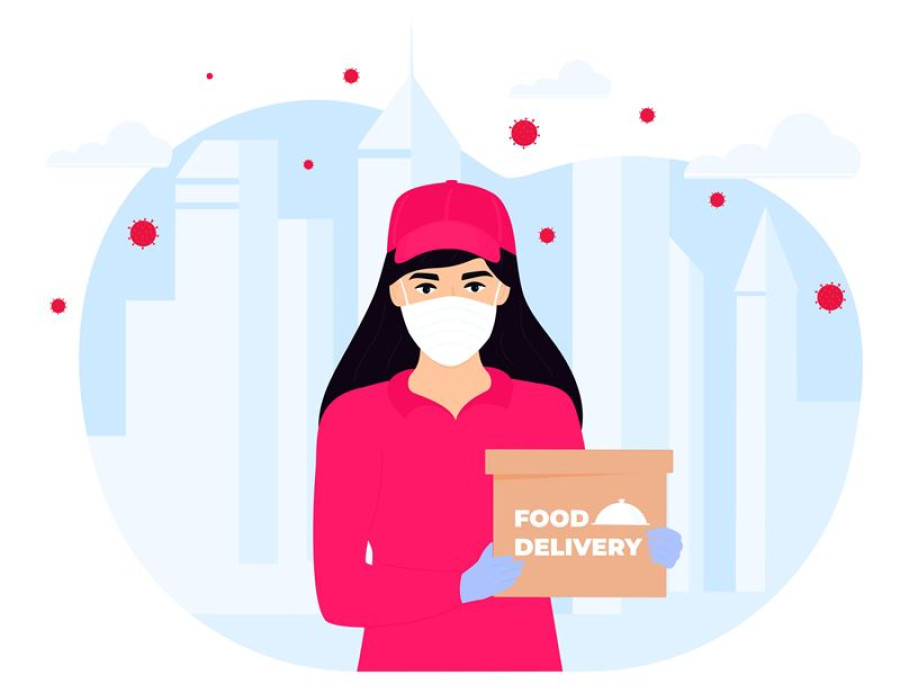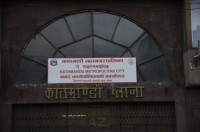Food
Will food delivery platforms survive the pandemic?
Before the pandemic hit Nepal, online food delivery was doing good business. But now, with hardly any revenue, its future looks grim.
Elisha Shrestha
While the majority of people in the Kathmandu valley are staying home to practice social distancing, Rupen Gurung is spending most of his time out on the road, rushing to make deliveries from restaurants and vegetable shops to customers in a small van.
The 20-year-old, who has been working for the last two years for food delivery platform Foodmandu, takes around 15-16 orders daily.
And Gurung is not complaining about the extra work. Amid the employment crisis created by the pandemic, he is grateful to have not been laid off and still has a monthly income. “I am helping people, by bringing food to them, and, at the same time, I am still able to financially support my parents,” said Gurung, who came to Kathmandu from Makwanpur two years ago to study as well as to earn a living.
But Gurung is concerned how long he’ll be able to hold on to his job.
The hospitality sector in the country has been hit hard by the pandemic and food delivery platforms like Foodmandu have been directly affected. To keep business afloat, the company Gurung works for started delivering daily essentials as well as takeaways. But as cases rise steadily and transportation restrictions tighten, the demand for daily essentials too has steeply declined, said Manohar Adhikari, the owner of Foodmandu. If the situation continues, the future for such businesses is uncertain.
“Before the lockdown, there were around 500 restaurants associated with us. However, due to Covid-19, we are now only working with 50 restaurants,” said Adhikari.
And Foodmandu is not alone. Other major online delivery hubs such as Foodmario, Bhoj Deal and Sasto Deal have also reported a steep decline in orders, setting stage for a devastating few months for such businesses.
According to Rohit Tiwari, owner of Foodmario, the company has only been able to conduct only 30 percent of its usual business following the lockdown. “Since the lockdown, we have been delivering only essential food products such as vegetables, fruits, meats and daily products. Although we get orders, the demand is very low,” said Tiwari.
With shops and restaurants closed, it would seem that people are ordering more, but they are not, said Tiwari, and it could be because people are scared to get in contact with outsiders.
“In the first two weeks of the lockdown, we were getting decent orders, as many as 100 a day. However, as the news related to Covid-19 and as death cases rose, people seem to have gotten more scared. This could be why many people are becoming sceptical of ordering and getting food from strangers,” said Tiwari.
This decline in business has already taken a toll on the workforce. In Tiwari’s company, he has already asked the majority of his staff to go on unpaid leave.
“Before the lockdown, we were the team of 37 employees of which 22 of them were delivery boys. However, now, out of 11 team members, only 8 or 9 delivery boys are on duty” said Tiwari. “ We will ask the others to return for work once our business is back on track.”
At Foodmandu too, out of around 150 delivery workers, only 30-40 are on duty currently while the rest are on unpaid leave. Many of the workers voluntarily chose to go on unpaid leave, said Adhikari.
“Due to the lack of transportation facilities, some employees could not come for work, while others didn’t want to work due to the fear of contracting the virus,” said Adhikari. To keep his business afloat, Adhikari’s company is providing salary to his employees on the basis of received orders.
Another problem that haunts the online food delivery business is confusion regarding transportation of goods. On March 25, the Ministry of Industry, Commerce and Supplies had announced that online stores operating as per government regulations can make home deliveries of essential products after ensuring that they are following the safety protocols and their staff are outfitted with protective gear.
And online platforms have been following the guidelines put forth, said Adhikari. “We deliver food and vegetables by van and we make sure that the van is washed with disinfectant every day. We have also made sanitizer, gloves, and face masks available for our delivery boys and drivers,” he said.
Along with sanitisation protocols, the platforms have also encouraged ‘contactless delivery’. Under the contactless delivery guideline, customers should prepay with the help of phone pay and online banking services such as eSewa and Khalti to prevent any form of physical contact. “We also recommend safe distance between the customers and delivery workers,” said Adhikari.
However, an apparent lack of communication and coordination between the Ministry and the police in relaying information to online suppliers has created a lot of confusion.
“Every day, at least one of our on-duty vans is taken under custody by the police on the pretext of not having a required travel document,” said Adhikari. “However, according to the government’s notice, being suppliers of essential products, we don’t need additional travel documents. There is clearly a lack of dissemination of information among the police,” said Adhikari, adding that due to such interference, they are losing on orders that are already few.
It is not only the food delivery companies that are facing the problems. Small and medium scale restaurants are also being affected by the strict transportation rules that have made it difficult to provide food delivery services.
Jugal Thapa, 24, owner of Hangout’s Restro and Bar, which is located in Lalitpur, said that after the lockdown was declared, he had to immediately close his restaurant. In two months, he has already faced losses of around Rs 600,000. With nine employees to pay and Rs 95,000 as rent for his restaurant’s building, he decided to start delivering food to ensure some revenue was coming in. “I was feeling a little stable, since I was getting as many as 30 to 40 orders and was making around Rs 40,000 per day,” said Thapa.
However, after the government announced to enforce the lockdown more strictly from May 15 with the rise in Covid-19 cases, Thapa said that he had to yet again halt his business. “The police are now not approving my travel document. For now, I have made an appeal to Lalitpur Metropolitan Office to grant me a travel document, specifying that I work for the food industry. But if I don’t get to continue my food delivery service, I may have to send some of my staff on unpaid leave,” said Thapa.
Although food delivery companies are now suffering immense loss, both Adhikari and Tiwari are hopeful that once the lockdown is lifted, there will be a rise in customer demand. But they also understand that there will be other complications.
“The restaurant industry, with which we work, will take time to recover even after the lockdown is lifted, which will affect us. We might also face the challenge of limited human resources since people may still be scared to work as delivery workers,” said Adhikari.
For now, there’s little else these businesses can do than to wait out the storm. “We are doing what we can to provide service and sustain our business—in any way we can. We have to maintain our niche in the market. Or else, it’s a challenge to even exist,” said Tiwari.




 9.7°C Kathmandu
9.7°C Kathmandu (1).jpg)










